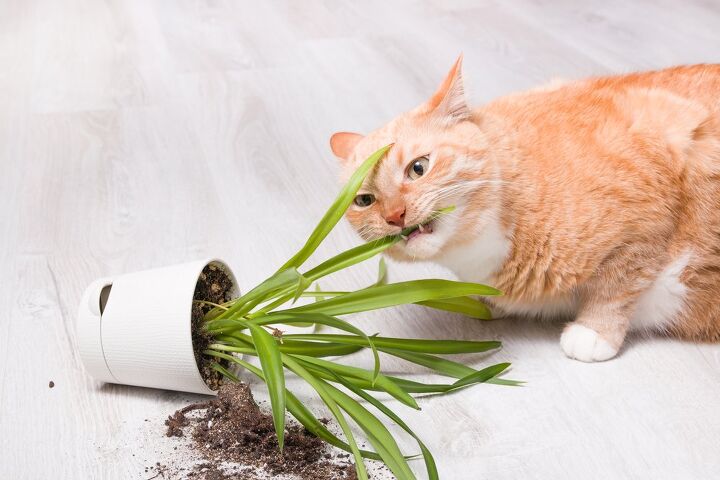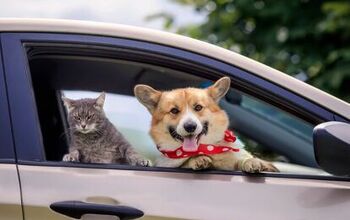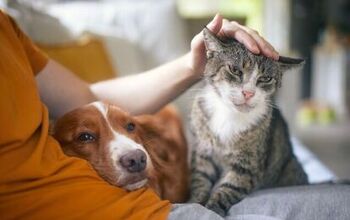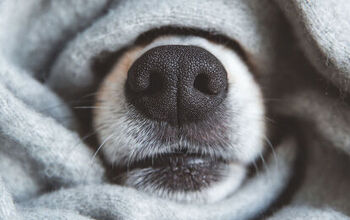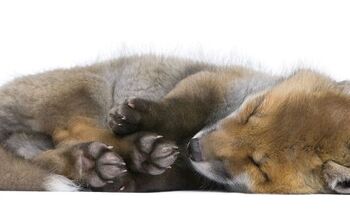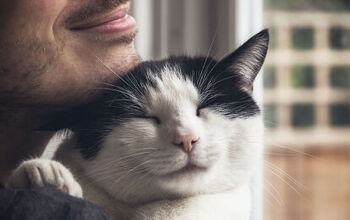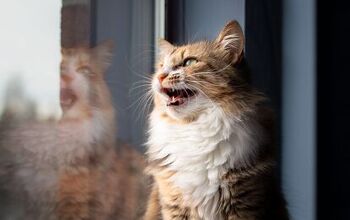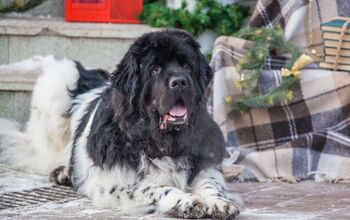Ask the Animal Communicator: My Cat Keeps Eating Our Plants

Felines are so fabulously mysterious. This is one of the (many) reasons we love them, right? But when our cat suddenly develops a strange new habit or mystifying behavior, we just want to solve the mystery right away. And that is always the right time to ask the animal communicator!
Dear Shannon,
I am co-pawrent to a four-year-old Maine Coon cat named Ernie. Ernie came to us as an already oversized kitten and has always had a hearty appetite – we used to free-feed him but now he only gets his food twice a day because he would eat so much of it!
Now Ernie has started attacking our house plants. We usually don’t let him go outside but we take him on leash walks a few times a week and when he does get out, he will immediately start eating grass and plants and even flowers.
I’ve never heard of a cat eating plants before. Is this Ernie’s way of telling us we are not feeding him enough?
Sincerely,
Barrett, Ernie’s co-pawrent
Shannon’s reply:
Hi Barrett,
Ernie clearly has a personality just as big as his furry body! I’m glad you reached out with your question – this is a situation where we want to hear from Ernie directly about what is going on.
I also just want to encourage you (if you haven’t done so already) to take Ernie to his feline veterinarian for a “well cat” exam to rule out any underlying health concerns that may be contributing to Ernie’s newfound interest in plants and grass. This is important both for Ernie’s health and for your own peace of mind.
When I initially tuned in with Ernie, his energy felt intelligent, lively, and inquisitive. I asked him what he likes to do and suddenly, I was seeing some very blurry images – like what you would see if you wore somebody else’s prescription glasses. I asked him what they were, and he must have backed up, because suddenly the images were farther away and in focus. The message is that Ernie likes to explore his world tangibly – he is tactile and hands-on and likes to touch and taste and sniff things up close.
Next, I asked Ernie directly about his new hobby of attacking houseplants and eating grass. Why does he do this? Again, he sent me the blurry images that got clear as he backed up. But since you mention Ernie has just started this new behavior, I asked him why now and not before?
I don’t think Ernie understood since he sent me the same blurry-to-clear image sequence a third time. So, I decided to pursue what I call the “20 questions” route to try to identify the source of the new behavior. First, I asked him what his favorite food is, and he showed me a big meaty bone. I asked him what he eats every day, and he showed me a silver dish with little pellets in it – kibble, I think? Using applied kinesiology (what some practitioners call muscle testing) I asked him if he likes this food and received a “yes” response. I asked him if he feels full after eating and received a “yes” response.
I switched the line of questioning to ask him more about his daily routine. I asked him what he does during the day, and he sent me several images of him sitting in different places – on a high shelf, on the back of a chair, on a window ledge. Suddenly I got an inner feeling of boredom and an inner knowing that he is the head of his own activities committee. In other words, he makes his own fun. And this fun includes attacking the plants and tasting grass and getting up close and personal with anything that interests him.
If time and budget permits, it feels like Ernie might be one of those cats who could enjoy feline training – learning to do tricks, playing with you using interactive cat toys like puzzle games and going for leash walks more often. He clearly has the smarts and the initiative (especially since he is already leash-trained) and so perhaps all that is missing is more opportunity.
Even though Ernie reported that his meals do fill him up and he likes the kibble, since he showed me something different for his favorite food, I always like to recommend feeding a fresh foods (complete and balanced) diet whenever possible. Fresh foods are easier for a cat’s body to absorb and make use of and fresh meals also can add a lot of enjoyment to a cat’s life! You may want to talk to Ernie’s veterinarian about the best way to switch him over to a fresh food diet.
It is true that sometimes cats will eat plant matter to self-medicate (zoopharmacognosy) in the way wild animals are known to do. Ernie’s veterinary exam can help to identify any nutrient imbalances or health issues that may be contributing factors.
But from what Ernie shared with me, it does feel like his primary reason is curiosity and just exploring his world. By providing some engaging alternatives through feline training, interactive cat toys and more leash walks, you may be able to successfully redirect Ernie’s attention away from your indoor plants. Another fun and safe alternative might be to get Ernie his own little “garden” indoors which you could seed with cat grass and cat-friendly herbs.
Barrett, I hope this eases your concerns about Ernie eating plants and grass. Please do keep me posted and let me know how Ernie is feeling and doing after he sees the vet.
From my heart,
Shannon

Shannon Cutts is an intuitive animal communicator and Reiki master practitioner with Animal Love Languages. Shannon works through the universal love language of all species to connect with her pet clients – deep listening. Deep listening activates empathy, allowing Shannon to literally feel what an animal is feeling, listen in to their thoughts, experience what they are experiencing and then relay all of that information to the pet parent. Visit Shannon at www.animallovelanguages.com
More by Shannon Cutts



